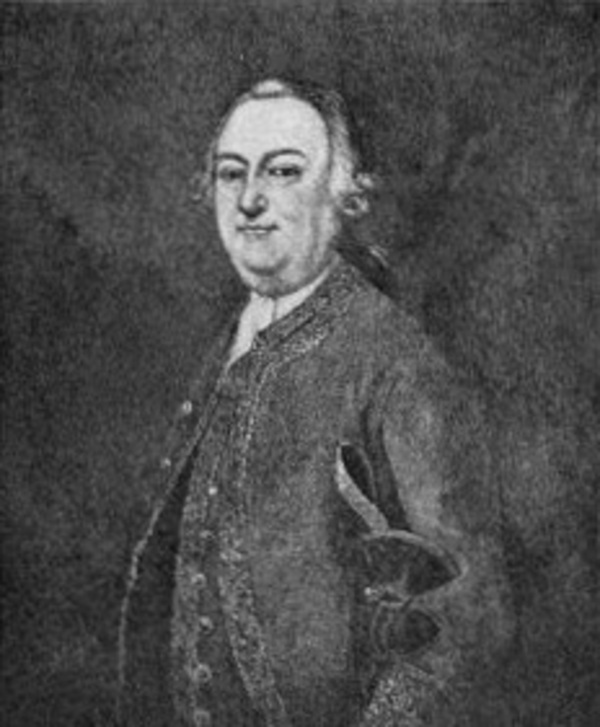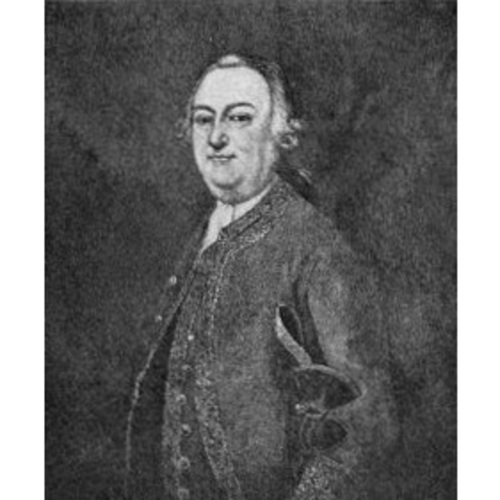
Source: Courtesy of Wikimedia Commons
WINSLOW, JOHN, army officer and office-holder; b. 10 May 1703 at Marshfield, Massachusetts, son of Isaac Winslow and Sarah Wensley; m. in 1725 Mary Little, and they had two sons; m. secondly Bethiah Johnson, née Barker; d. 17 April 1774 at Hingham, Massachusetts.
John Winslow was a member of one of the most prominent families of New England; his great-grandfather and grandfather had both been governors of the Plymouth Bay colony. After holding a few minor positions in Plymouth, he was commissioned captain of a provincial company in the abortive Cuban expedition organized in 1740. Apparently through the influence of Governor William Shirley of Massachusetts, Winslow transferred soon afterwards to the British army and served as a captain in Richard Philipps*’ regiment (40th Foot) at Annapolis Royal, Nova Scotia, and St John’s, Newfoundland. In 1751 he exchanged with a half-pay captain of Shirley’s former regiment and returned to Massachusetts, where he looked after his property and represented Marshfield in the General Court of 1752–53. In 1754 he was promoted major-general of militia by Shirley and chosen to command a force of 800 men which was sent to the Kennebec River (Maine) to consolidate British positions in the area and prevent French encroachments. There Winslow planned and built forts Western (Augusta, Maine) and Halifax (Winslow, Maine). The expedition added greatly to his popularity, and he was thus a natural choice as the lieutenant-colonel of a provincial regiment raised by Shirley in 1755 to aid Lieutenant Governor Charles Lawrence* of Nova Scotia in his attempts to sweep French influence from the province.
Winslow played a conspicuous role at the capture of Fort Beauséjour (near Sackville, N.B.) in June 1755 and in the defeat of French ambitions in the Chignecto region during the summer; his journals provide an important eye-witness account. Throughout the expedition differences of temperament had caused him to clash with the commander, Lieutenant-Colonel Robert Monckton, a British regular officer; problems of pay and provisioning added to the tension. Monckton appears to have used little tact in dealing with his touchy second in command, at one point ordering that Winslow’s regimental colours be forcibly seized. A furious Winslow confided to his journal that “This Transaction Causd Great uneassiness to both officers & Soldiers & raisd my Temper some.” He was probably equally to blame for the friction, however, since he resented not having been given command of the expedition.
After the reduction of the French forts in the Chignecto region, Winslow was ordered to proceed to Grand Pré, the largest Acadian community in the Minas area, and there carry out the removal of the population of that region. Although often believed solely responsible for carrying out the deportation, Winslow was in charge of only one segment of a much larger operation. On 5 Sept. 1755 he informed the assembled Acadian men of the Grand Pré region that they, their families, and their portable goods were to be removed from the province. Winslow termed the business “Very Disagreable to my natural make & Temper,” but he carried out his orders with care, military precision, and as much compassion as circumstances allowed. The numerous delays in procuring transports caused the deportation to take far longer than had been anticipated, but by November he had shipped some 1, 510 Acadians to Pennsylvania, Maryland, and other British colonies to the south. Plans had been previously made to use Winslow as an agent for the settlement of the now vacant farm lands, but they were not carried out.
Winslow instead returned to Massachusetts in November, and the following year reached the high point of his military career when he was appointed by Shirley to command the provincial troops in the expedition against Fort Saint-Frédéric (near Crown Point, N.Y.). However, he fought bitterly with Lord Loudoun, the commander-in-chief, over Loudoun’s proposed integration of the provincial troops with the regulars. The provincial soldiers had enlisted to serve only under their own officers, while their officers feared that if the integration came about they would lose their rank, which they held only by colonial commission. The issue nearly developed into a mutiny of the provincial troops and a revolt of their officers, but Winslow eventually agreed to the integration under threats from Loudoun and after pleadings from Shirley. Little of military importance, however, was achieved in the campaign.
This expedition appears to have marked the end of Winslow’s military career. He returned to Massachusetts in 1757 and represented Marshfield in the General Court from 1757 to 1758 and from 1761 to 1765. In 1762 he served as a member of the St Croix River boundary commission, and about 1766 moved to Hingham, where he lived the rest of his life.
Winslow’s journals have been published: “Journal of Colonel John Window of the provincial troops, while engaged in removing the Acadian French inhabitants from Grand Pre . . .” and “Journal of Colonel John Window of the provincial troops, while engaged in the siege of Fort Beausejour, in the summer and autumn of 1755 . . . ,” N.S. Hist. Soc., Coll., III (1883), 71–196, and IV (1885), 113–246.
Mass. Hist. Soc., Gay coll., Mascarene papers, II, p.4; III, pp.133, 135–36; Window papers, 61.E1.31, 61.E1.32, 61.E1.33, 61.E1.36, 61.E1.38, 61.E1.42, 61.E1.60. PAC, MG 11, [CO 217], Nova Scotia A, 30, pp.55–57. PANS, RG 1, 21, f.148. Correspondence of William Shirley (Lincoln), II, 492–93, 495–98, 525–27. Military affairs in North America, 1748–65 (Pargellis), 54. N.S. Archives, I, 396. DAB. DCB, III (biography of Charles Lawrence). Sabine, Biographical sketches of loyalists, II, 439–44. H. E. Dunnack, Maine forts (Augusta, Maine, 1924), 234. Murdoch, History of N.S., II. Pargellis, Lord Loudoun, 88–91. G. A. Rawlyk, Nova Scotia’s Massachusetts: a study of Massachusetts-Nova Scotia relations, 1630 to 1784 (Montreal and London, 1973), 209–11. J. A. Schutz, William Shirley, king’s governor of Massachusetts (Chapel Hill, N.C., 1961), 175–76, 178–79, 187–89, 228, 234–35. G. A. Wood, William Shirley, governor of Massachusetts, 1741–1756; a history (New York, 1920), 96, 98.
Cite This Article
Barry M. Moody, “WINSLOW, JOHN,” in Dictionary of Canadian Biography, vol. 4, University of Toronto/Université Laval, 2003–, accessed December 22, 2025, https://www.biographi.ca/en/bio/winslow_john_4E.html.
The citation above shows the format for footnotes and endnotes according to the Chicago manual of style (16th edition). Information to be used in other citation formats:
| Permalink: | https://www.biographi.ca/en/bio/winslow_john_4E.html |
| Author of Article: | Barry M. Moody |
| Title of Article: | WINSLOW, JOHN |
| Publication Name: | Dictionary of Canadian Biography, vol. 4 |
| Publisher: | University of Toronto/Université Laval |
| Year of publication: | 1979 |
| Year of revision: | 1979 |
| Access Date: | December 22, 2025 |



